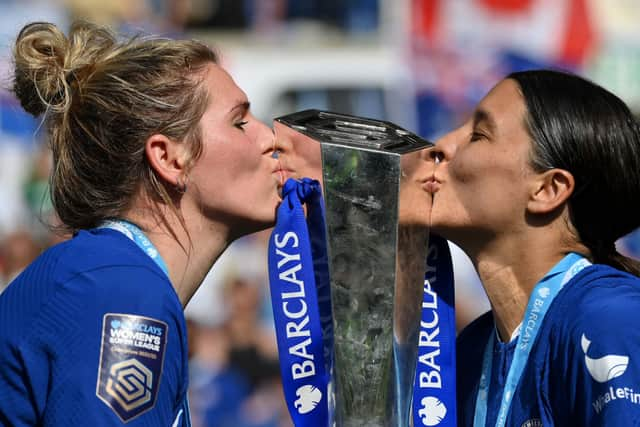Women’s World Cup 2023: ‘Fifa has historically undervalued the women’s game’ says Forza Football CEO
and live on Freeview channel 276
The countdown is on - it’s now less than a month until the Women’s Fifa World Cup begins in Australia and New Zealand with England hopeful of securing their legacy as both European and World Champions.
The success of the Euros, in England especially, has spiked a phenomenal interest in women’s football throughout the country with football fans eager to watch the likes of Alessia Russo and Rachel Daly take on Matilda’s Sam Kerr or Spain’s Ona Batlle.
Advertisement
Hide AdAdvertisement
Hide AdHowever, it was only just a few weeks ago that Gianni Infantino dramatically revealed he was close to banning the broadcasting of the fixtures in certain regions, the United Kingdom being one such that was to suffer the ban.
The FIFA president said European broadcasters had offered world football’s governing body $1 million to $10 million for the rights, compared to £100m-$200m for the men’s world cup.
"Should the offers continue not to be fair, we will be forced not to broadcast the Fifa Women’s World Cup into the ‘big five’ European countries," Infantino said at a World Trade Organization meeting in Geneva.
"I call, therefore, on all players, fans, football officials, presidents, prime ministers, politicians and journalists all over the world to join us and support this call for a fair remuneration of women’s football. Women deserve it, as simple as that."
Advertisement
Hide AdAdvertisement
Hide Ad

However, Forza Football’s CEO Jonas Linné points out: “Fifa has historically undervalued the women’s game.”
Speaking exclusively to NationalWorld, Linne detailed how, contrary to his publication which details men and women’s football coverage equally, Fifa has attempted to use the Women’s World Cup as a power play in order to further aggrandise their own political agenda: “Fifa is in the position where they have a monopoly on the biggest event and they think they can do whatever they want.
It was just a way to express their power and try to get the most of it - it was a negotiating trick to get it where (Infantino) wanted it to be.”
There is, unfortunately, a certain element of truth behind Fifa’s announcement. The difference in broadcasting sums between the men and women’s game was abhorrent but hardly a complete surprise for the majority of us who are aware of the disputes and variations when it comes to the marketing, promoting and advertising of the women’s game.
Advertisement
Hide AdAdvertisement
Hide AdThe Women’s World Cup is usually bundled together with the men’s game with broadcasters able to bid for the tournaments as more of a package deal with the women’s competition treated as an add-on.
For the first time, however, this was not the case with the women’s event being sold separately but Linne remarks that Fifa “thought it would be possible to sell it in the same way instead of having an understanding. You need to start early, market, sell it and improve the product but Fifa was caught by surprise when the offers they wanted did not come in.”
After such a boom in views, finances and interest in women’s football following the explosive Euros tournament, it is overwhelmingly disheartening that such broadcasting opportunities have fallen flat ahead of what could be one of the biggest tournaments in women’s sport ever.
The optimists among us will have anticipated that such public criticisms of disparity between the broadcasting offers will signal a need for further development within the promoting of women’s football but, as Linne indicates: “I don’t have that much hope. The value of the world cup should have been higher than what was offered but (FIFA) don’t have the credibility to say that.”
Advertisement
Hide AdAdvertisement
Hide AdComment Guidelines
National World encourages reader discussion on our stories. User feedback, insights and back-and-forth exchanges add a rich layer of context to reporting. Please review our Community Guidelines before commenting.
